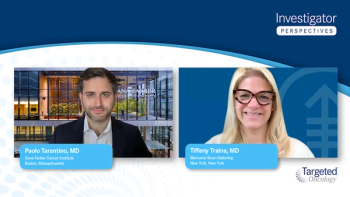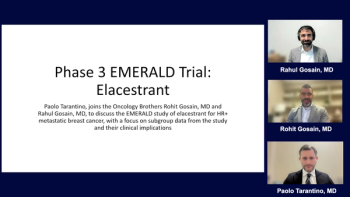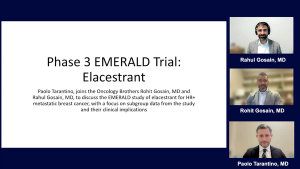Articles by Paolo Tarantino, MD

An expert discusses the complexities of sequencing antibody-drug conjugates (ADCs) in metastatic triple-negative breast cancer, emphasizing the need for biomarker-driven treatment personalization and crossover trial designs to optimize early use and improve patient outcomes.

An expert discusses emerging real-world strategies for managing adverse effects of antibody-drug conjugates (ADCs) in metastatic triple-negative breast cancer (mTNBC), emphasizing the importance of patient education about toxicities such as alopecia while highlighting the potential of ADCs to improve progression-free survival and quality of life.

An expert discusses the importance of managing adverse effects of antibody-drug conjugates (ADCs) in metastatic triple-negative breast cancer (mTNBC), highlighting strategies such as prophylactic growth factor support and emerging genetic screening for UGT1A1 polymorphisms to personalize and optimize patient care.

An expert discusses the importance of timely biomarker testing and emerging challenges in treatment sequencing for metastatic triple-negative breast cancer (mTNBC), as first-line use of antibody-drug conjugates (ADCs) raises concerns about cross-resistance and the need for strategic postprogression planning.

An expert discusses the evolving role of biomarker testing in first-line metastatic triple-negative breast cancer (mTNBC), highlighting how PD-L1, BRCA status, and emerging markers such as Trop-2 expression are shaping personalized treatment approaches and guiding the integration of antibody-drug conjugates (ADCs) and immunotherapy.

An expert discusses how emerging trial data, particularly from ASCENT-04, are reshaping first-line treatment strategies for PD-L1–positive metastatic triple-negative breast cancer (mTNBC) by demonstrating the potential superiority of antibody-drug conjugates (ADCs) combined with immunotherapy over standard chemotherapy regimens.

An expert discusses how recent clinical advancements and biomarker-driven strategies are reshaping first-line treatment decisions in metastatic triple-negative breast cancer (mTNBC), emphasizing the critical need for early, optimized therapy to improve outcomes in this aggressive disease.

Panelists discuss the rapidly evolving endocrine treatment landscape in oncology, emphasizing the shift toward personalized therapy guided by tumor biomarkers such as ESR1, PI3K, and HER2-low, with excitement about new targeted agents and combination strategies expected over the next 5 years; they highlight challenges in treatment sequencing and resistance but remain optimistic that ongoing research and emerging data will enable more effective, tailored care that improves survival, delays toxicity, and potentially enhances cure rates.

Panelists discuss recent phase 3 trials of novel endocrine agents in advanced breast cancer, highlighting benefits—especially in patients with ESR1 mutations—from proteolysis-targeting chimeras (PROTACs) and oral selective estrogen receptor degraders (SERDs), including early switching based on molecular monitoring and combination strategies with CDK4/6 inhibitors; they emphasize the favorable safety profiles and the promise of personalized regimens, while also looking ahead to ongoing studies evaluating these agents earlier in treatment to improve cure rates and reduce recurrence in hormone receptor–positive breast cancer.

Panelists discuss the ELEVATE trial’s ongoing evaluation of elacestrant combined with targeted agents such as ribociclib, capivasertib, and everolimus, emphasizing the importance of optimizing dosing—such as the ribociclib reduction to 400 mg on a 3-weeks-on, 1-week-off schedule—to balance efficacy and tolerability, and highlighting the trial’s role in advancing precision combination therapies that may reshape treatment sequences in hormone receptor–positive breast cancer.

Panelists discuss the EMBER-3 trial, which evaluated single-agent oral selective estrogen receptor degrader (SERD) imlunestrant vs standard endocrine therapy and the combination of imlunestrant with abemaciclib beyond progression, highlighting enhanced progression-free survival with the combination regardless of ESR1 mutation status, underscoring the promise of dual blockade strategies to overcome resistance while emphasizing the need to balance efficacy, safety, and biomarker use as treatment paradigms evolve.

Panelists discuss the SERENA-6 trial evaluating camizestrant, which uniquely enrolled patients with molecularly detected ESR1 mutations before clinical progression, showing that early switching to this oral selective estrogen receptor degrader (SERD) improved progression-free survival and quality of life compared with continuing standard therapy, while highlighting ongoing questions about long-term benefits, optimal timing, and the practical challenges of frequent circulating tumor DNA (ctDNA) monitoring in clinical practice.

Panelists discuss recent phase 3 trials introducing novel endocrine agents such as proteolysis-targeting chimeras (PROTACs) that target estrogen receptors through new mechanisms, highlighting modest progression-free survival benefits—especially in patients with ESR1-mutated disease—and generally favorable tolerability profiles, while underscoring the importance of monitoring unique adverse effects and the potential for these therapies to advance treatment of endocrine-resistant metastatic breast cancer.

Panelists discuss the expanding array of treatment options for metastatic hormone receptor–positive breast cancer, emphasizing the critical role of molecular testing—both tissue biopsy and circulating tumor DNA (ctDNA)—in identifying targets and guiding therapy selection, with serial ctDNA testing enabling dynamic monitoring of tumor evolution and timely adjustments to personalized treatment plans.

Panelists discuss that although the use of everolimus has declined with newer targeted therapies, it remains an important option for patients without ESR1 mutations or PI3K/AKT pathway alterations, improving outcomes when endocrine therapy alone is ineffective and serving as a valuable alternative in later treatment lines when other targeted agents are unsuitable.

Panelists highlight that oral endocrine therapies for hormone receptor-positive breast cancer are generally well tolerated with manageable mild adverse effects, whereas PI3K/AKT/mTOR inhibitors often cause more challenging toxicities such as hyperglycemia and diarrhea, leading many clinicians to prioritize better-tolerated endocrine agents initially to balance efficacy with patient quality of life.

Panelists discuss that for patients with both ESR1 and PIK3CA mutations after progression on CDK4/6 inhibitors, single-agent elacestrant shows meaningful clinical activity and is often favored in the second line due to its efficacy and tolerability, with more toxic combination regimens typically reserved for later treatment lines.

Panelists discuss that, based on EMERALD trial data, elacestrant provides consistent clinical benefit in metastatic breast cancer regardless of ESR1 mutation allele frequency, supporting the use of any detectable ESR1 mutation—regardless of variant allele frequency (VAF)—as a valid criterion for treatment selection.

Panelists discuss how real-world evidence has reinforced the clinical effectiveness of oral selective estrogen receptor degraders observed in the EMERALD trial, showing consistent benefit—even in more heavily pretreated and diverse patient populations—thereby validating the drug’s utility and expanding its role in routine care for ESR1-mutated metastatic breast cancer.

Panelists discuss how clinical trial data support the consistent efficacy of oral selective estrogen receptor degraders (SERDs) across diverse metastatic breast cancer subgroups—including patients with visceral disease, HER2-low tumors, or co-mutations such as PIK3CA—reinforcing the drug’s versatility and value as a treatment option beyond narrowly defined molecular profiles.

Panelists discuss the evolving management of estrogen receptor (ER)-positive, HER2-negative metastatic breast cancer, highlighting the clinical impact of oral selective estrogen receptor degraders (SERDs)—particularly in patients with ESR1 mutations—while emphasizing the importance of biomarker-guided therapy selection and ongoing reassessment to optimize outcomes in the context of prior endocrine and CDK4/6 inhibitor exposure.

Paolo Tarantino, MD, PhD, discusses elacestrant as a treatment option for patients with ESR1-mutated metastatic breast cancer in the second line.

Paolo Tarantino, MD, PhD, discusses the approval of the oral therapy elacestrant for patients with estrogen receptor-positive, HER2-negative advanced or metastatic breast cancer with ESR1 mutations.

Along with the Oncology Brothers, Paolo Tarantino, MD, discusses ongoing studies investigating oral selective estrogen receptor degraders, including trials exploring use of elacestrant in combination with other therapies.

Along with the Oncology Brothers, Paolo Tarantino, MD, discusses what has been learned about the safety profile of elacestrant and shares clinical pearls for adverse event management, aimed at helping patients remain on therapy while maximizing their quality of life.

Along with the Oncology Brothers, Paolo Tarantino, MD, discusses the post -hoc subgroup analysis from the EMERALD study (SABCS 2023), which examined outcomes in patients with ESR1 mutations (ESR1m) who had been on CDK4/6 inhibitors (CDK4/6i) plus endocrine therapy for 12 months or longer, and shares her his perspectives on how these findings may influence the use of elacestrant in ER+/HER2–- metastatic breast cancer (MBC) and impact clinical practice for community oncologists.

Along with the Oncology Brothers, Paolo Tarantino, MD, elaborates on results from an analysis of data from the EMERALD study that were reported at the San Antonio Breast Cancer Symposium (SABCS) 2022. This analysis identified duration of prior CDK4/6 inhibitor therapy as a potential surrogate marker for endocrine sensitivity, and discusses how these findings could help guide patient selection for elacestrant.

Along with the Oncology Brothers, Paolo Tarantino, MD, discusses how ESR1 mutations are commonly observed in hormone receptor-positive breast cancer after prolonged endocrine therapy, and emphasizes the importance of molecular testing for ESR1 mutations at both the initial diagnosis of MBC and at each subsequent progression using liquid biopsy assays.

Along with the Oncology Brothers, Paolo Tarantino, MD, explores how ESR1 mutations frequently co-occur with other molecular alterations and the importance of maximizing endocrine-based therapy before moving on to antibody-drug conjugates or chemotherapy.

Along with the Oncology Brothers, Paolo Tarantino, MD, provides an overview of the phase 3 EMERALD study that evaluated the efficacy of elacestrant as a second-line treatment for ER+, HER2- MBC, particularly in patients with tumors harboring an ESR1 mutation.







